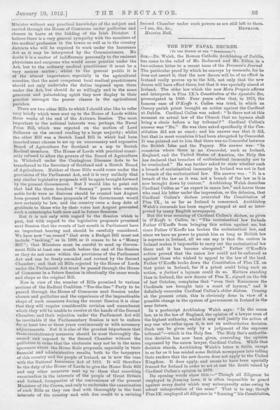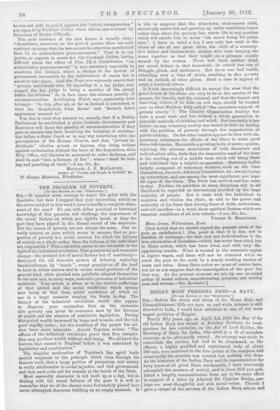THE NEW PAPAL DECREE.
I To TRH EDITOR OP T8& " EPROTATOR."1 Sin.,—Dr. Walsh, the Roman Catholic Archbishop of Dublin, has come to the relief of Mr. Redmond and Mr. Dillon in a two-column letter to a recent issue of the Freeman's Journal The particular proof by which be conveys by innuendo, for he does not assert it, that the now decree will be of no effect in Ireland really proves up to the hilt, not only that the new decree will have effect there, but that it was specially aimed at Ireland. The older law which the new Motu Proprio affirms and interprets is Pius IX.'s Constitution of the Apostolic See, . promulgated in 1869. Four years after that, in 1873, the famous case of O'Keeffe v. Cullen was tried, in which an Ossory parish priest brought an action against the Cardinal at Dublin. Cardinal Cullen was asked " Is there not at this moment an actual law of the Church that no layman shall bring a cleric before a lay tribunal ?" Cardinal Cullen's answer was " No." He was then asked specifically if the Con- stitution did not so enact ; and his answer was that it did, but that in most countries it had been abrogated by Concordat. It was pointed out to him that there was no Concordat between the British Isles and the Papacy. His answer was : " In countries where there is no Concordat, such as Ireland, England, and the United States of America, the Holy See has declared that breaches of ecclesiastical immunity are to be overlooked." He was further asked to state whether such a breach of ecclesiastical immunity in Ireland was not in fact a breach of the ecclesiastical law. His answer was : " It is a breach of the law as it was, not a breach of the law as it is now brought down by custom." Archbishop Walsh describes Cardinal Cullen as " an expert in canon law," andleaves those who read his letter under the impression, or the delusion, that Cardinal Cullen's dictum overruled the Constitution of Pius IX,, in so far as Ireland is concerned. Archbishop Walsh's innuendo has been eagerly grasped at and so inter- preted by many English newspapers.
But the true meaning of Cardinal Cullen's dictum, as given in O'Keefe v. Cullen, is : "The ecclesiastical law forbade Father O'Keeffe from bringing this action against me, but since Father O'Keeffe has broken the ecclesiastical law, and since we have no power to punish him as long as British law is supreme in Ireland, all we can say is that the custom in Ireland makes it impossible to carry out the ecclesiastical law there and it has become abrogated." Father • O'Keeffe's action proved that the canon law could not be enforced as against those who wished to appeal to the law of the land. Father O'Keeffe broke down the Constitution of Pius IX. on that point in Ireland, for if a priest could bring such an action, a fortiori a layman could do so. Matters standing thus in Ireland, the new decree of Pius X., signed on the 9th of last October, complains that "even their Eminences the Cardinals are brought into a court of laymen," and it definitely overrules Cardinal Cullen's °biter dictum. Coming at the present crisis, this is obviously done in view of a possible change in the system of government in Ireland in the near future.
In a postscript Archbishop Walsh says : " In the canon law, as in the law of England, the opinion of a lawyer even of the highest authority, whilst it may well justify the action of
any one who relies upon it, is not an authoritative decision. Such can be given only by a judgment of the supreme
tribunal"—which is the Holy See. The Holy See's authorita- tive decision has now been given, overruling the opinion expressed by the canon lawyer, Cardinal Cullen. While that decision stands, Archbishop Walsh's letter is futile, except in so far as it has misled some British newspapers into telling their readers that the new decree does not apply to the United Kingdom. It does apply, and seems to have been specially framed for Ireland in order to set at rest the doubt raised by Cardinal Cullen's opinion in 1873.
Its opening words show this :—" Though all diligence be employed in framing laws, it is often impossible to guard against every doubt which may subsequently arise owing to adroit interpretation of the same." That is to say, though Pius IX. employed all diligence in " framing " his Constitution,
he was not able to guard against the "adroit interpretation" put upon it by Cardinal Cullen when driven into a corner by the action of Father O'Keeffe.
The next sentence of the new decree is equally clear :
"Sometimes, moreover, on the part of jurists there are such contrary opinions that the law cannot be otherwise ascertained than by an authoritative pronouncement." That is to say jurists, or experts in canon law like Cardinal Cullen, having differed about the effect of Pius IX.'s Constitution, "an authoritative pronouncement" is now necessary, especially in countries like Ireland, where a change in the system of government favourable to the enforcement of canon law is about to take place. And the Pope now expressly enacts that "private individuals who, by appealing to a lay judge, may compel the lay judge to bring a member of the clergy before his tribunal " do in fact incur the extreme penalty of excommunication. Archbishop Walsh says, apparently with triumph : "So this, after all, so far as Ireland is concerned, is what the thunderbolt from Rome' and home's latest aggression' amount to."
Yes, this is what they amount to, namely, that if a Dublin
Parliament be established a pious Catholic Government and Executive will incur the penalty of excommunication if they pass or execute any laws involving the bringing of ecclesias- tics before a State Court or in any way interfering with the prerogatives of the Roman Church, and that "private in- dividuals," whether priests or laymen, who bring actions against ecclesiastics without the leave of the Inquisition, alias Holy Office, will likewise be sentenced to outer darkness, and shall be cast "into a furnace of fire " : where "shall be wail- ing and gnashing of teeth."—I am, Sir, &c., 13 .ellteyne Mansions, Wimbledon.











































 Previous page
Previous page